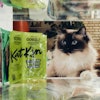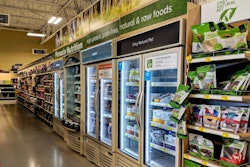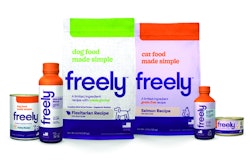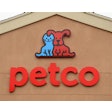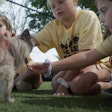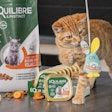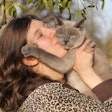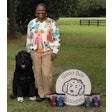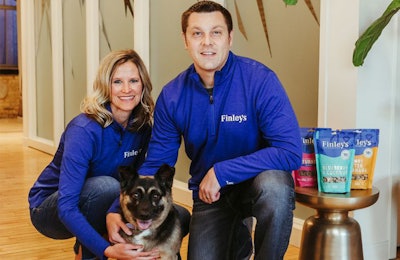
Finley’s Barkery co-founders Angie Gallus (president) and Kyle Gallus (CEO) did not set out to have careers in pet food. The two are special education teachers; Angie taught for 21 years and Kyle taught for 10 years, and it turned out to be those careers that set them on the path they’re on now, making dog treats with a mission.
“Finley’s was launched based on a classroom concept I had (related to making pet treats) way back in 2010 at the high school level,” says Angie. “At the end of 2015 I had two former students who were now young adults, 22 and 23 at the time, reach out to me over social media. They said, hey, when we can we make dog treats with you again? It was out of nowhere, and I was like well, let’s do it. I dug out all of our old recipes from the classroom that we used to bake in, and we had those two former students over and we cut dog treats for the afternoon. But I noticed that while it was like jumping back on a bike with the cutting, they had lost a lot of the academic pieces, the reading, the math. And I also saw that here they were, 22 and 23 years old, and at the time neither one of them had a job. And they both had so much potential. It just bothered me and Kyle, and we talked a lot about it and decided we needed to do something to change this.”
Getting Finley’s off the ground
The Galluses launched Finley’s in 2016 using a commercial kitchen near where they lived in Minneapolis, Minnesota, USA. They hired employees like the kids they’d been teaching for years: individuals with disabilities who needed experience or skills training or just an open door through which to enter the workforce. Initially the fledgling business was cutting treats two nights a week, but then through a stroke of luck actor Ashton Kutcher shared a video about Finley’s to his social media channels.
“Our production went from two nights a week to four nights a week, then five nights a week, and then until 2:00 in the morning,” says Angie. At that point their abilities both physically and mentally to continue to scale up hit a wall, and Angie and Kyle decided they needed to look into more expansive options. Additionally, those options needed to include continued employment for their ambassadors, the official title of their employees.
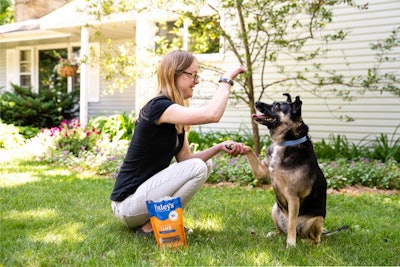
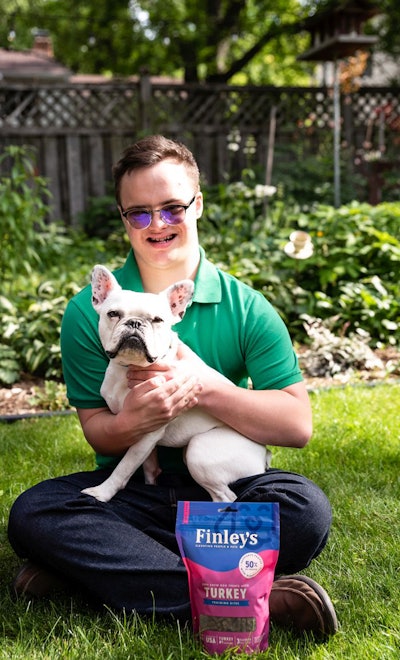
Company Ambassadors like Lucy, with Finley, and Joe, with Moose, serve as the faces of the company, employed in marketing and social media as well as sales roles. | Courtesy Finley’s Barkery
“We were able to find some awesome manufacturing partners to come behind us and we did a little pivot of our business model,” says Angie. “Now our ambassadors work as our marketing teams and on our advocacy teams. They no longer hand cut the treats but they are the face of our company, out doing store demonstrations, community events, things like that. We were able to pivot knowing that we still wanted to provide opportunities for them outside the manufacturing facilities.”
Finley’s mission: educating and promoting inclusion
Given their background in special education, it’s no surprise that the Galluses have continued to make education and inclusion primary platforms at Finley’s — not just with regard to ensuring their employees are gaining the career skills needed to thrive, but in letting other companies know that there’s a different way to do things.
“What we’re most proud of is the number of people and retailers now coming to us and saying, ‘How can we be better?’,” says Kyle. “The world needs help; it needs a positive story. People want to focus on diversity and inclusion, and the best question they’re asking because of our brand is ‘how.’ What’s cool about our products is it starts that conversation. People are so open to inclusion, and they’re looking for people and brands to help them break that barrier, hire people and understand that there are so many jobs that can be created if you take a step back and look at the opportunities.”
In addition, COVID-19 has provided a unique opportunity to expand the idea of inclusion through accessibility.
“We’ve had to really pivot how we engage with our ambassadors,” says Angie. “In March (2020) we had to stop all grocery store demonstrations with our team. At the time I was getting worried, because I was hearing from a lot of our program directors that some of our ambassadors were feeling very isolated. The whole disability community was feeling very isolated, along with a lot of other people. And so we had to take a look at how we were going to make a change.”
That change turned out to involve technology, particularly Zoom.
“I feel like Zoom has pros and cons, but it’s also about accessibility,” says Kyle. “We think about people with disabilities, and transportation is a major barrier. So where they weren’t necessarily able to join us for sales pitches to retailers in Florida or California or Texas, what’s really cool now is it’s just an open door. It’s just a Zoom link and they can hop on (and participate).”
The next question then becomes, what does that opportunity of accessibility look like, not just for the pet industry but for every industry?
“Zoom gives people so much video access to have a conversation that they normally might not have had,” says Kyle. “And that has really been one of the things that has kicked open some doors in the retail space, showing retail partners online what’s happening and also being able to celebrate (company successes). We have ambassadors and affiliates all over the country, and one of the coolest things has been being able to keep everybody aware of (successes) and talking about what that’s going to look like in terms of more job opportunities.”
Expansion during a pandemic: growing business
Retail growth beyond the Midwest for Finley’s took off in March 2020, which the Galluses could not have predicted would involve such challenges as no travel, no in-person contact and having to figure out how to engage potential partners and educate them on the company’s mission. Unsurprisingly with the explosion of e-commerce due to the pandemic, Chewy.com has been a significant partner in that growth.
“We launched with Chewy in June 2020,” says Kyle. “Our conversation with Chewy a year prior was them letting us know: We love what you do, we love this mission, we want to get your products up on our site, we want to help you. But it’s a bigger conversation, as well. How can a new brand succeed online? And we got a lot of support from Chewy as an online retailer, and they really understood how to help us understand the industry and how to grow. From an e-commerce perspective they’ve been extremely pivotal in helping us understand the bigger digital picture.”
The other big retail win for Finley’s is Target; the company’s products will start appearing on store shelves in February 2021.
“Target is really committed to helping the small brand with the huge mission grow in the right way,” says Kyle. The retailer initially said no to Finley’s, according to Kyle, and it took some time to learn what Target was looking for from both a product and a logistics standpoint. “When we were able to meet those requirements, with our mission and what Target’s looking to do with inclusivity, they gave us the yes,” says Kyle.
Given these new partnerships, Finley’s is expecting significant growth in 2021 to tack on to their 158% growth in sales in 2020. The company started with four SKUs, all oven-baked biscuits, but in 2020 due to popular demand introduced soft chew trainer bites in four formulas — and the bites have been so successful that they now outsell the biscuits two to one.
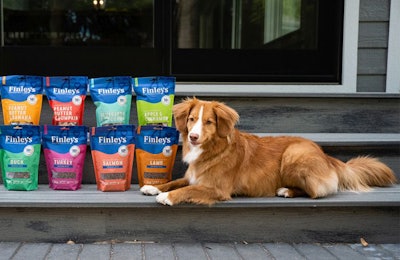
Nova Scotia Duck Tolling Retriever Spice poses with the company’s latest product, soft chew trainer bites, which are now Finley’s most popular item. | Courtesy Finley’s Barkery
Finley’s future
“I always tell people what I love about my job is that I still feel like I have such a huge piece of education with me because I get to interact with a lot of the people,” says Angie. “Kyle and I have had the privilege of going boots on the ground with some of our sales representatives to different pet stores, and when people are able to hear our story and our mission first-hand from us, it’s great to see the response we get and how positive they are.”
Continued education and expansion of their inclusive mission will carry Finley’s into 2021 and beyond, and they hope to share that mission with anyone who wants to listen.
“We don’t necessarily have all the answers, and that’s okay,” says Kyle. “But we have a different way to look at employment models and opportunities to challenge retailers and manufacturers and engage them in the conversation. It’s about always having the lens of opportunity, and not having the mindset where everything needs to fit in one box because that’s how it’s always been.”
Fast Facts
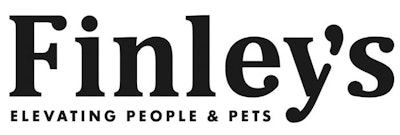
Headquarters: Minneapolis, Minnesota, USA
Officers: Angie Gallus, co-founder and president; Kyle Gallus, co-founder and CEO
Brands: Finley’s
Website/Social Media: www.getfinleys.com; @getfinleys on Facebook and Instagram
Notable: In April 2017, Finley’s was fortunate to have Ashton Kutcher share a video about the brand to his social media platforms as “a business anyone can get behind.” Once this happened, they increased their hours of production and gained local retailer interest.

